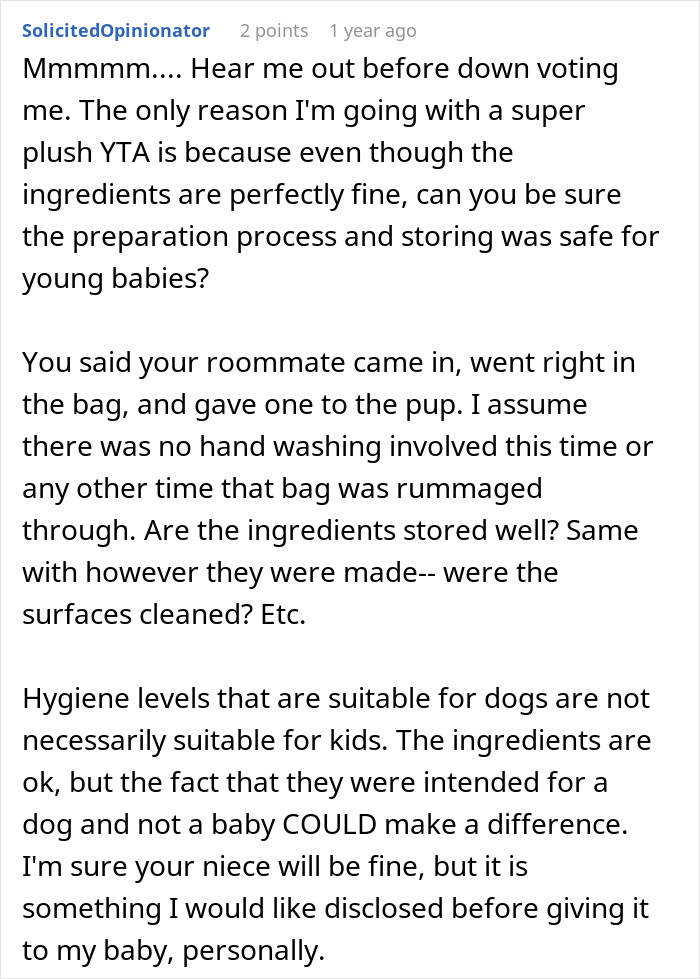Sister’s Meltdown Leaves Woman Questioning: “aita For Giving My Niece ‘dog Food’?”
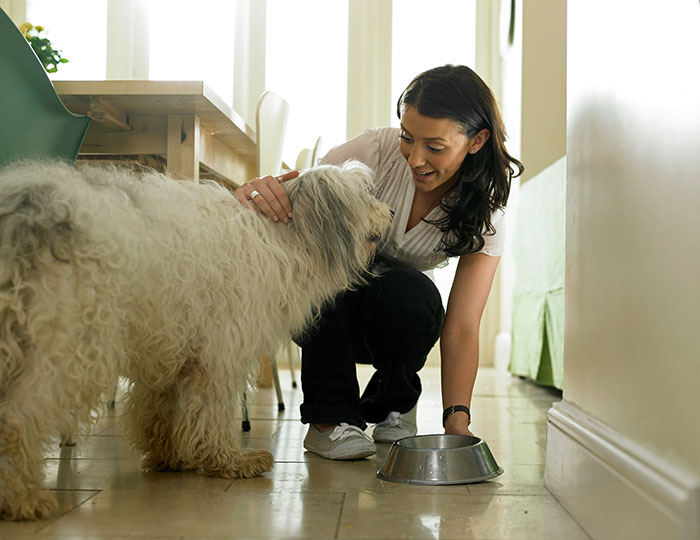
In some ways, having a pet is a lot like having a baby. You’re responsible for loving them, feeding them, taking care of them and keeping them safe. You have to keep a close eye on what they put in their mouths, and there are a few things that you should never feed them. And, of course, when they need to go potty, someone needs to guide them to the proper place or clean up their mess after (or both!).
But according to one mother, you should never feed babies and dogs the same foods, even if the ingredients are perfectly safe for both. Below, you’ll find a story that was posted in the “Am I the [Jerk]?” subreddit detailing how an aunt found herself in hot water after giving her niece a snack. And keep reading to find conversations with Charlotte Stirling-Reed, the Baby and Child Nutritionist, and registered dietitian Kinga Balogh from JM Nutrition.
This woman was happy to give her niece a frozen treat while she was visiting
Image credits: Getty Images/Unsplash (not the actual photo)
But when her sister realized that the snack was originally made for a dog, she started freaking out

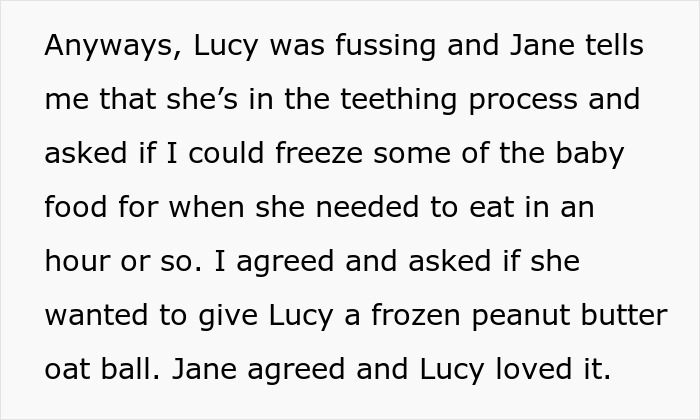
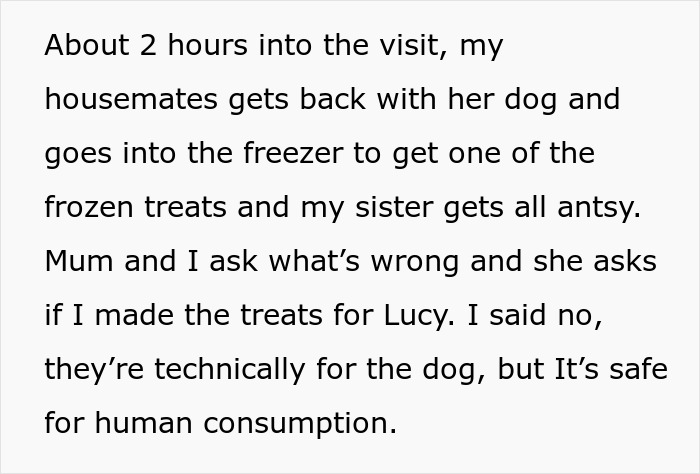
Image credits: Logan Cameron/Unsplash (not the actual photo)
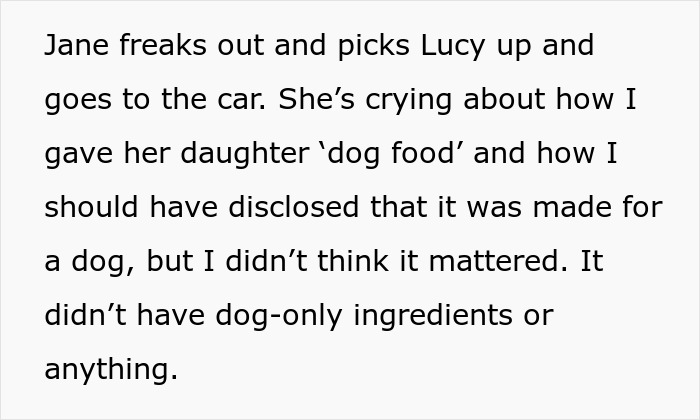
Image credits: throwARhesa10but
“You do have to be careful not to offer foods that are of inappropriate texture, shape or firmness to young babies”
Image credits: Kateryna Hliznitsova/Unsplash (not the actual photo)
To find out more about this situation and what’s appropriate to feed babies at such a young age, we got in touch with Charlotte Stirling-Reed, the Baby and Child Nutritionist, and registered dietitian Kinga Balogh from JM Nutrition. The experts were kind enough to have a chat with Bored Panda and explain which foods we should avoid giving to 9-month-olds.
“At 9 months of age, babies are still learning and developing skills around eating, such as self-feeding and oral motor skills,” Charlotte shared. “This is why you do have to be careful not to offer foods that are of inappropriate texture, shape or firmness to young babies.”
“For example, whole nuts are not recommended due to their shape and size. Whole grapes and round shaped foods such as large blueberries and cherry tomatoes aren’t recommended due to the risk they pose for choking,” the nutritionist noted. “Additionally, hard raw vegetables and foods like crackers and large chunks of cheese aren’t recommended for young babies without being adapted first.”
Kinga added that parents should start offering solid foods to babies at around 6-months old. “Babies are ready for solids if they can hold their head up, sit up and lean forward, open their mouth to accept food, pick up and try to bring food to their mouths or when they can let you know that they are done eating, by the act of turning their heads away,” she explained. “Babies do not need to have their teeth fully erupted to start with solids, yet the texture and consistency of food needs to be adjusted to their dentition.”
But the dietitian says that caregivers should pay attention to the following things: texture of food, nutrient density, watching for symptoms of allergic reaction, choking risks and the baby’s signaling around hunger and fullness cues.
“When introducing foods for the first time, start with cooked, finely minced, ground or mashed meats, boneless fish, chicken, eggs, tofu and beans,” Kinga noted. “Also, small pieces of cooked or soft raw fruits and vegetables without skin are also good options. Iron-fortified cereals, regular fat-content yogurt, pureed soups and stews also work well at this stage.”
It’s also wise to feed infants foods that are rich in nutrients, as baby food and snack style cookies, cereals and crackers are often loaded in sugar and salt, she continued.
“To avoid the risk of allergic reactions, common allergens, such as milk, eggs, fish, shellfish, tree nuts, peanuts, wheat, soybeans, and sesame should be introduced separately starting at about 6-months of age,” Kinga told Bored Panda “Strategic inclusion of one food item at a time allows for identifying foods with possible allergy-inducing potential.”
“Lastly, babies are born with innate abilities to eat intuitively. Their body has accurate hunger and fullness regulating mechanisms in place, so parents are encouraged to feed little ones until they show early signs of food refusal,” Kinga says. “This can be a reliable indicator that they are done eating in the context of a meal or snack.”
“While furry friends often consume human-grade food choices, offering treats specifically prepared for animals to infants may come across as an insult”
Image credits: Ivana Cajina/Unsplash (not the actual photo)
While the ingredients mentioned in this story are all perfectly healthy for human consumption and more specifically for toddlers, the mother’s strong response may be triggered by feeling misled and mistreated with the food offered, Kinga added.
“From a dog owner’s perspective, pets may be considered furry babies, yet parents of toddlers without pets often see a stronger delineation between animals and human offspring,” she explained. “While furry friends often consume human-grade food choices, offering treats specifically prepared for animals to infants may come across as an insult to petless parents.”
“From an ingredient point of view these are all safe ingredients to give to young babies,” Charlotte says. “Oats are nutrient-dense, bananas are often a firm favorite as a weaning food, and peanut butter is also a nutrient dense option for babies that can be given early on in the weaning journey.”
“However, the method of offering the peanut butter may be of concern as it’s recommended that common allergens (such as the peanut butter in the dog treat) are offered for the very first time to a baby in a very small amount – this is to check for an allergic reaction,” she pointed out.
“If it’s the first time an allergen is offered, it’s best to offer it as the only new food a baby has that day and to allow time and awareness for monitoring for a reaction,” Charlotte continued. “Additionally, the size, shape and texture of the dog treat may have made it inappropriate for a baby of 9 months of age.”
Kinga also warns that peanut butter is a common allergy trigger in infants. “Also, the texture and shape of the bites could be of concern, particularly if it is a frozen round shaped blob of food that can easily present a choking hazard,” she noted.
In this case, however, it’s possible that the mother was simply offended and found it insulting that her daughter was offered a “dog treat.”
“The fact of the matter is that in developed countries, such as North America, pets often have more variety and abundance of foods than what’s available for human consumption in less developed and impoverished countries,” Kinga continued. “Humans often want to assert moral superiority and maintain access to superior foods compared to their animal counterparts.”
“Food fights may be taking place in order to bypass addressing more deeply rooted issues in family dynamics”
Image credits: Getty Images/Unsplash (not the actual photo)
“These lines often become more blurred when it comes to pet nutrition. Animal companions often become family members with equal or superior privileges to humans in most families,” she explained. “Jane may not see it this way, however the aunt may look at their pet as a family member just as her 9-month old niece, and not strictly distinguish between animal versus human-grade food. Many people prepare pet foods from scratch with high-quality ingredients often rivaling commercially prepared foods intended for human consumption.”
It’s also possible that the mother’s frustration is coming from another place entirely. “Often, people fight about food that is offered, yet food is only a proxy,” Kinga pointed out. “Possibly, there are deeper conflicts, hurt feelings or trespasses from the past that require closer attention. Food fights may be taking place in order to bypass addressing more deeply rooted issues in family dynamics.”
So why is it so important to always get a parent’s permission before feeding something to their child?
“All babies are different in terms of how they take to weaning and what developmental stage they are at in terms of their eating and self feeding skills,” Charlotte shared. “Offering something that’s an inappropriate texture could be a risk for choking and offering an allergen that hasn’t been tried yet or even an ingredient that a baby is already allergic to can be dangerous and lead to an allergic reaction.”
“Parents and guardians may have a dietary plan, preference or restriction in place that they want to honor, for health or religious reasons,” Kinga added. “Feeding infants and toddlers is even more challenging, as parents are gradually introducing new foods, textures, possibly allergy-inducing foods in addition to breastfeeding or providing infant formula.”
“It is recommended to have open dialogue in families and circles of friends about eating preferences. Also, parents should advocate for respecting their wishes and desires when it comes to feeding their kids,” the dietitian continued.
“Often, parents feel violated when aunts or grandparents secretly sneak in foods they would not normally allow for their children. In hopes of helping kids develop a healthy relationship with food, open and transparent discussion would help prevent eating challenges down the road for growing kids,” Kinga says. “If immediate caregivers and extended family and friends are on the same page about food choices, kids are not receiving mixed messages about food and can hopefully develop a more harmonious relationship with food.”
“It’s important when anyone is looking after a young baby and planning to feed them, they understand what that baby can be given to eat that is appropriate”
Image credits: Andrej Lišakov/Unsplash (not the actual photo)
“Babies can actually eat a wide variety of foods, even from an early age,” Charlotte added. “But parents will all lead their baby on their weaning journey at different paces, so it’s important when anyone is looking after a young baby and planning to feed them, they understand what that baby can be given to eat that is appropriate for them at that stage.” And if you’d like to learn more about this topic, be sure to check out Charlotte’s online weaning course!
While parents have the final say in what foods their kids are given, Kinga added that it’s best for them to avoid having strict food rules for their children. “Parents are certainly ‘gatekeepers’ of what foods come into the household and kids are in charge of communicating how much they want to consume of certain foods,” she noted. “As kids grow older, start school or have money to purchase occasional meals or snacks outside of the house, they will notice how their peers may eat a wider variety of options, possibly more ‘processed’ foods.”
“Early strict food rules in households often predispose growing kids to overindulgences and possibly feelings of guilt when consuming foods that are not acceptable in their home environment,” the expert continued. “This can certainly set off an unhealthy relationship with food and overconcern about how to eat ‘right.’”
“Extended family and friends certainly need to follow the family’s medically or religiously warranted food requirements, however they can certainly initiate discussion when they notice overzealous food rules, limiting a multitude of foods,” Kinga says.
“While most growing bodies and adults benefit from a diet based on predominantly wholesome ingredients and home cooked meals, inclusion of some convenience items is also warranted given the time crunch today’s families’ face,” she noted. “Aiming for balance and variety in one’s diet can be achieved without having to follow a plethora of restrictive food rules and compulsive label reading practices.”
“Ensure your family chooses whole grains, obtains good sources of plant and animal protein options, includes an abundance of fruits and vegetables, enjoys dairy products in moderation and reaches for heart healthy fat options,” the dietitian says. “Eating more decadent meals for special occasions or holidays should not be guilt producing as long as we attend to our hunger and fullness cues, and don’t look at these occasions as opportunities to overindulge.”
The majority of readers sided with the author, noting that the snack she gave her niece was harmless
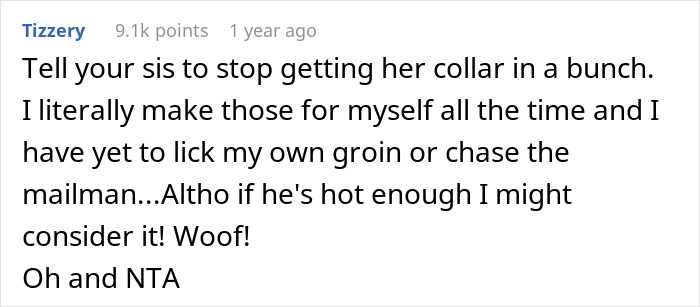


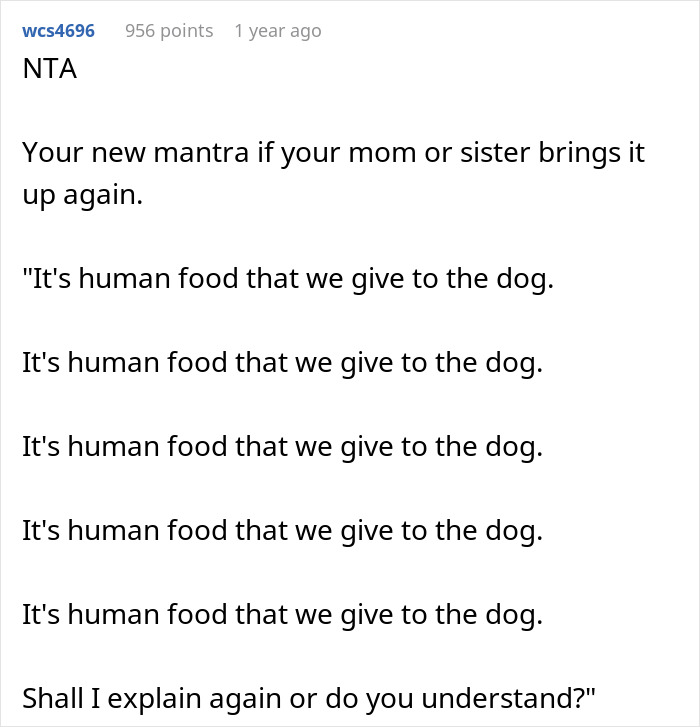

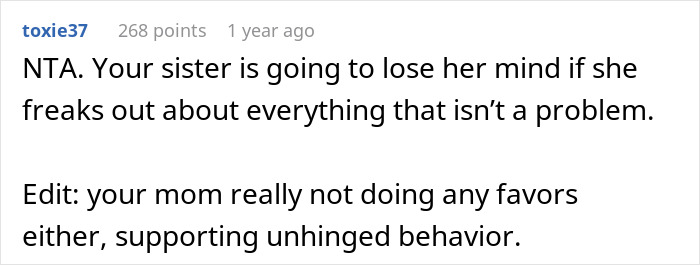
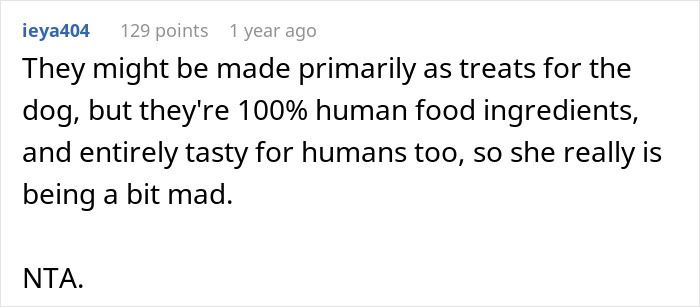
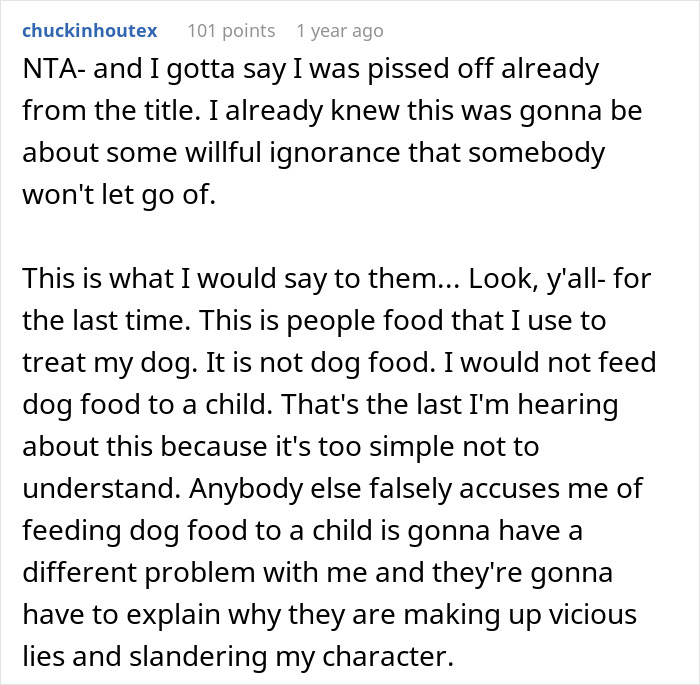





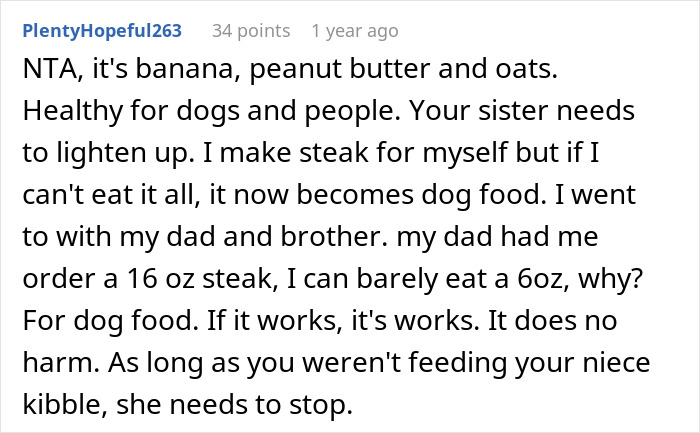





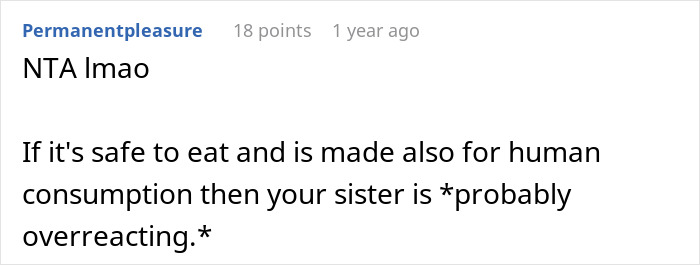





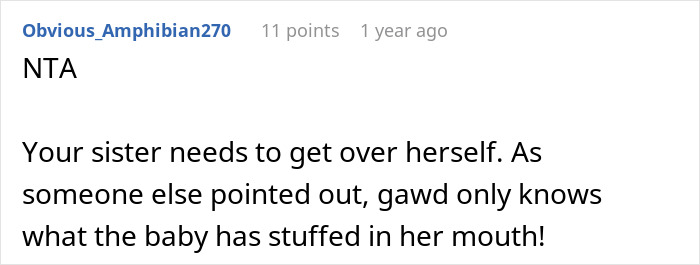

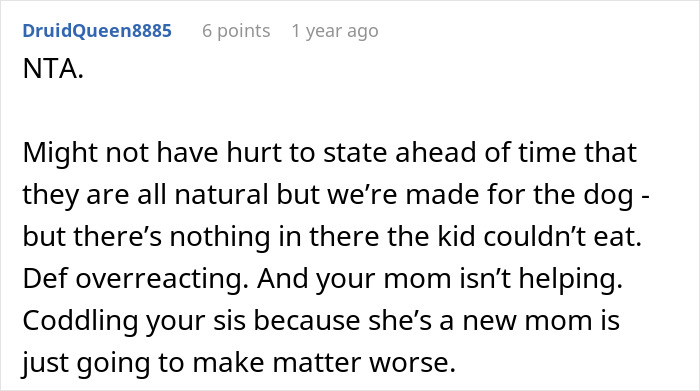



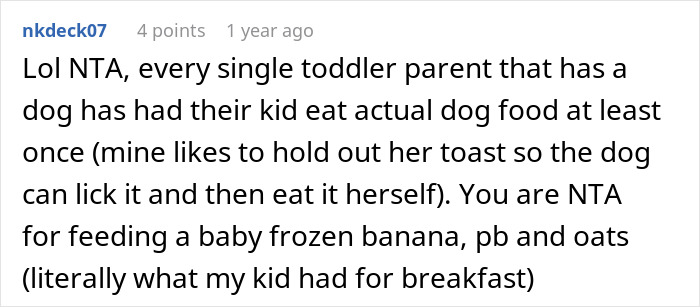
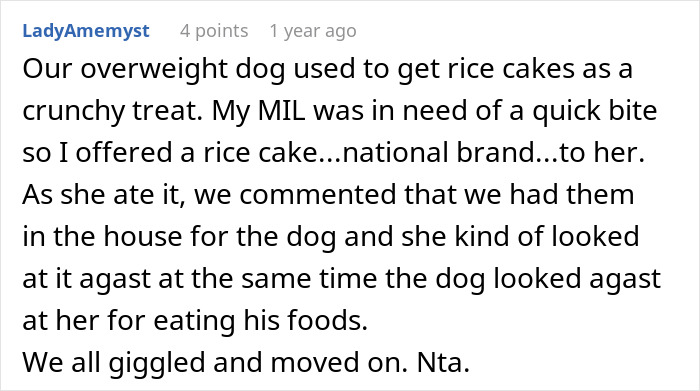




However, some thought that the woman was in the wrong for giving her niece a snack without her mother’s permission

